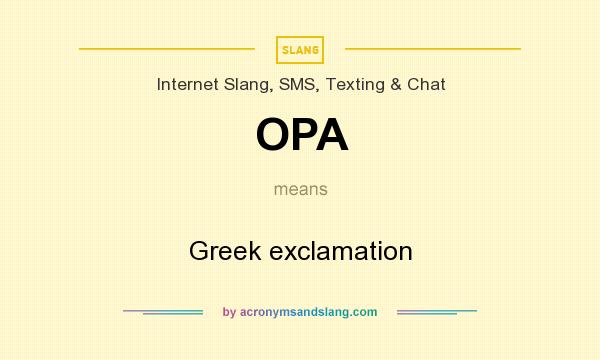
OPA Meaning: Unraveling the Significance of “Opa”
The term “opa” might sound simple, but its meaning and usage vary significantly across different cultures and contexts. Understanding the nuances of opa meaning requires a deeper dive into its origins and how it’s employed in various settings. This article aims to provide a comprehensive explanation of opa meaning, exploring its cultural roots, common uses, and potential interpretations.
The Greek Origins of “Opa”
Perhaps the most well-known association of “opa” is with Greek culture. In Greece, “opa” is an exclamation used to express joy, surprise, or enthusiasm. It’s often shouted during celebrations, such as weddings, parties, or even when someone accomplishes something significant. The act of breaking plates, though less common today, is often accompanied by shouts of “opa” as a symbol of letting go and embracing the moment.
The etymology of “opa” in Greek is somewhat debated, but it’s generally believed to be an expression stemming from a feeling of excitement or release. It’s not necessarily tied to a specific word or phrase, but rather a spontaneous outburst of emotion. Therefore, understanding opa meaning in the Greek context involves appreciating its role as a verbal expression of strong positive emotions.
“Opa” Beyond Greece: Global Interpretations
While “opa” is strongly associated with Greece, it’s essential to recognize that the term has also found its way into other cultures and languages, sometimes with different meanings. For example, in some Germanic languages, “opa” can refer to a grandfather. This divergence in meaning underscores the importance of context when interpreting the significance of “opa”.
“Opa” as Grandfather in Germanic Languages
In German and Dutch, “opa” is a common term of endearment for grandfather. This usage is entirely distinct from the Greek exclamation and highlights how a single word can have drastically different meanings based on linguistic and cultural background. When encountering the term “opa”, it’s crucial to consider the speaker’s origin to accurately determine the intended opa meaning.
“Opa!” as a Restaurant and Brand Name
The lively and celebratory connotation of “opa” has also made it a popular choice for business names, particularly in the food and beverage industry. Restaurants with names like “Opa!” often aim to evoke a sense of fun, festivity, and delicious Mediterranean cuisine. This branding strategy leverages the positive associations linked to the Greek expression, further influencing the perception of opa meaning.
The Cultural Significance of “Opa”
The cultural significance of “opa” extends beyond its literal definition. In Greece, it represents a spirit of celebration, community, and living in the moment. It’s a reminder to embrace joy and let go of inhibitions. This cultural weight contributes to the enduring appeal and widespread recognition of “opa” as a symbol of Greek culture.
Understanding the cultural context is paramount to truly grasping the opa meaning. It’s not just a word; it’s an embodiment of a particular cultural ethos. Whether it’s shouted at a wedding or used as a greeting for a beloved grandfather, “opa” carries with it a rich tapestry of cultural associations.
How to Use “Opa” Correctly
Using “opa” correctly depends entirely on the context. In a Greek setting, shouting “opa” during a celebration would be perfectly appropriate. However, using it in a formal business meeting would likely be out of place. Similarly, referring to your grandfather as “opa” is common in German or Dutch-speaking families, but would be nonsensical in a Greek context.
Therefore, before using “opa”, consider your audience, the setting, and your intention. Misusing the term could lead to confusion or even offense. Being mindful of the cultural implications of opa meaning is essential for effective communication.
The Enduring Popularity of “Opa”
Despite its relatively simple structure, “opa” has maintained its popularity across cultures and languages. Its vibrant and expressive nature makes it a memorable and impactful word. Whether it’s used to express joy, affection, or simply to add a touch of cultural flair, “opa” continues to resonate with people around the world.
The enduring popularity of “opa” is a testament to its versatility and cultural significance. It’s a word that transcends linguistic boundaries, carrying with it a universal message of celebration and connection. This lasting appeal reinforces the importance of understanding the various facets of opa meaning.
“Opa” in Modern Media
The term “opa” frequently appears in modern media, including films, television shows, and music. Its inclusion often serves to add a touch of authenticity or cultural flavor to a scene. For instance, a movie depicting a Greek wedding might feature characters shouting “opa” during the festivities. These portrayals contribute to the continued awareness and understanding of opa meaning.
Furthermore, the use of “opa” in advertising and branding further solidifies its association with positive emotions and cultural heritage. Companies often use the term to create a sense of warmth, authenticity, and connection with consumers. This strategic deployment of “opa” reinforces its cultural significance and broadens its reach.
Conclusion: Embracing the Multifaceted Meaning of “Opa”
In conclusion, the opa meaning is multifaceted and context-dependent. From its roots as a Greek exclamation of joy to its role as a term of endearment for grandfather in Germanic languages, “opa” showcases the diverse ways in which language can evolve and adapt across cultures. Understanding these nuances is essential for effective communication and cultural appreciation.
By exploring the origins, uses, and cultural significance of “opa”, we gain a deeper understanding of its enduring appeal and widespread recognition. Whether you’re celebrating a special occasion, greeting a loved one, or simply seeking to add a touch of cultural flair to your language, “opa” offers a vibrant and expressive way to connect with others and embrace the moment. The true opa meaning lies in its ability to evoke feelings of joy, connection, and cultural pride. [See also: Greek Culture and Traditions] [See also: German Language and Customs]
